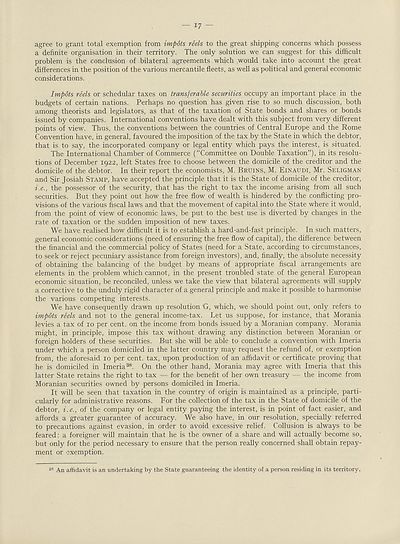Download files
Complete book:
Individual page:
Thumbnail gallery: Grid view | List view

— i7
agree to grant total exemption from imftdts reels to the great shipping concerns which possess
a definite organisation in their territory. The only solution we can suggest for this difficult
problem is the conclusion of bilateral agreements which would take into account the great
differences in the position of the various mercantile fleets, as well as political and general economic
considerations.
Impels reels or schedular taxes on transferable securities occupy an important place in the
budgets of certain nations. Perhaps no question has given rise to so much discussion, both
among theorists and legislators, as that of the taxation of State bonds and shares or bonds
issued by companies. International conventions have dealt with this subject from very different
points of view. Thus, the conventions between the countries of Central Europe and the Rome
Convention have, in general, favoured the imposition of the tax by the State in which the debtor,
that is to say, the incorporated company or legal entity which pays the interest, is situated.
The International Chamber of Commerce (“Committee on Double Taxation”), in its resolu¬
tions of December 1922, left States free to choose between the domicile of the creditor and the
domicile of the debtor. In their report the economists, M. Bruins, M. Einaudi, Mr. Seligman
and Sir Josiah Stamp, have accepted the principle that it is the State of domicile of the creditor,
i.e., the possessor of the security, that has the right to tax the income arising from all such
securities. But they point out how the free flow of wealth is hindered by the conflicting pro¬
visions of the various fiscal laws and that the movement of capital into the State where it would,
from the point of view of economic laws, be put to the best use is diverted by changes in the
rate of taxation or the sudden imposition of new taxes.
We have realised how difficult it is to establish a hard-and-fast principle. In such matters,
general economic considerations (need of ensuring the free flow of capital), the difference between
the financial and the commercial policy of States (need for a State, according to circumstances,
to seek or reject pecuniary assistance from foreign investors), and, finally, the absolute necessity
of obtaining the balancing of the budget by means of appropriate fiscal arrangements are
elements in the problem which cannot, in the present troubled state of the general European
economic situation, be reconciled, unless we take the view that bilateral agreements will supply
a corrective to the unduly rigid character of a general principle and make it possible to harmonise
the various competing interests.
We have consequently drawn up resolution G, which, we should point out, only refers to
impots reels and not to the general income-tax. Let us suppose, for instance, that Morania
levies a tax of 10 per cent, on the income from bonds issued by a Moranian company. Morania
might, in principle, impose this tax without drawing any distinction between Moranian or
foreign holders of these securities. But she will be able to conclude a convention with Imeria
under which a person domiciled in the latter country may request the refund of, or exemption
from, the aforesaid 10 per cent, tax, upon production of an affidavit or certificate proving that
he is domiciled in Imeria38. On the other hand, Morania may agree with Imeria that this
latter State retains the right to tax — for the benefit of her own treasury — the income from
Moranian securities owned by persons domiciled in Imeria.
It will be seen that taxation in the country of origin is maintained as a principle, parti¬
cularly for administrative reasons. For the collection of the tax in the State of domicile of the
debtor, i.e., of the company or legal entity paying the interest, is in point of fact easier, and
affords a greater guarantee of accuracy. We also have, in our resolution, specially referred
to precautions against evasion, in order to avoid excessive relief. Collusion is always to be
feared: a foreigner will maintain that he is the owner of a share and will actually become so,
but only for the period necessary to ensure that the person really concerned shall obtain repay¬
ment or exemption.
38 An affidavit is an undertaking by the State guaranteeing the identity of a person residing in its territory.
agree to grant total exemption from imftdts reels to the great shipping concerns which possess
a definite organisation in their territory. The only solution we can suggest for this difficult
problem is the conclusion of bilateral agreements which would take into account the great
differences in the position of the various mercantile fleets, as well as political and general economic
considerations.
Impels reels or schedular taxes on transferable securities occupy an important place in the
budgets of certain nations. Perhaps no question has given rise to so much discussion, both
among theorists and legislators, as that of the taxation of State bonds and shares or bonds
issued by companies. International conventions have dealt with this subject from very different
points of view. Thus, the conventions between the countries of Central Europe and the Rome
Convention have, in general, favoured the imposition of the tax by the State in which the debtor,
that is to say, the incorporated company or legal entity which pays the interest, is situated.
The International Chamber of Commerce (“Committee on Double Taxation”), in its resolu¬
tions of December 1922, left States free to choose between the domicile of the creditor and the
domicile of the debtor. In their report the economists, M. Bruins, M. Einaudi, Mr. Seligman
and Sir Josiah Stamp, have accepted the principle that it is the State of domicile of the creditor,
i.e., the possessor of the security, that has the right to tax the income arising from all such
securities. But they point out how the free flow of wealth is hindered by the conflicting pro¬
visions of the various fiscal laws and that the movement of capital into the State where it would,
from the point of view of economic laws, be put to the best use is diverted by changes in the
rate of taxation or the sudden imposition of new taxes.
We have realised how difficult it is to establish a hard-and-fast principle. In such matters,
general economic considerations (need of ensuring the free flow of capital), the difference between
the financial and the commercial policy of States (need for a State, according to circumstances,
to seek or reject pecuniary assistance from foreign investors), and, finally, the absolute necessity
of obtaining the balancing of the budget by means of appropriate fiscal arrangements are
elements in the problem which cannot, in the present troubled state of the general European
economic situation, be reconciled, unless we take the view that bilateral agreements will supply
a corrective to the unduly rigid character of a general principle and make it possible to harmonise
the various competing interests.
We have consequently drawn up resolution G, which, we should point out, only refers to
impots reels and not to the general income-tax. Let us suppose, for instance, that Morania
levies a tax of 10 per cent, on the income from bonds issued by a Moranian company. Morania
might, in principle, impose this tax without drawing any distinction between Moranian or
foreign holders of these securities. But she will be able to conclude a convention with Imeria
under which a person domiciled in the latter country may request the refund of, or exemption
from, the aforesaid 10 per cent, tax, upon production of an affidavit or certificate proving that
he is domiciled in Imeria38. On the other hand, Morania may agree with Imeria that this
latter State retains the right to tax — for the benefit of her own treasury — the income from
Moranian securities owned by persons domiciled in Imeria.
It will be seen that taxation in the country of origin is maintained as a principle, parti¬
cularly for administrative reasons. For the collection of the tax in the State of domicile of the
debtor, i.e., of the company or legal entity paying the interest, is in point of fact easier, and
affords a greater guarantee of accuracy. We also have, in our resolution, specially referred
to precautions against evasion, in order to avoid excessive relief. Collusion is always to be
feared: a foreigner will maintain that he is the owner of a share and will actually become so,
but only for the period necessary to ensure that the person really concerned shall obtain repay¬
ment or exemption.
38 An affidavit is an undertaking by the State guaranteeing the identity of a person residing in its territory.
Set display mode to:
![]() Universal Viewer |
Universal Viewer | ![]() Mirador |
Large image | Transcription
Mirador |
Large image | Transcription
Images and transcriptions on this page, including medium image downloads, may be used under the Creative Commons Attribution 4.0 International Licence unless otherwise stated. ![]()
| League of Nations > Economic and financial section > Double taxation and tax evasion > (23) |
|---|
| Permanent URL | https://digital.nls.uk/190911607 |
|---|
| Shelfmark | LN.II |
|---|
| Description | Over 1,200 documents from the non-political organs of the League of Nations that dealt with health, disarmament, economic and financial matters for the duration of the League (1919-1945). Also online are statistical bulletins, essential facts, and an overview of the League by the first Secretary General, Sir Eric Drummond. These items are part of the Official Publications collection at the National Library of Scotland. |
|---|---|
| Additional NLS resources: |
|

